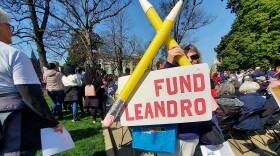A new commission tasked with giving input on a decades-long court case with broad implications for public education in North Carolina met for the first time this week.
Governor Roy Cooper swore in 18 members of the Governor's Commission on Access to Sound, Basic Education at its inaugural meeting Thursday. Cooper is asking the board of educational experts to weigh in on how the state can meet the requirements of the landmark 1997 Leandro decision.
After being sworn in, the commission received a full history of the case from the attorneys who first argued it.
Two decades ago, the state Supreme Court ruled in Leandro v. State that the North Carolina Constitution guarantees every child in the state the right to the "opportunity to receive a sound basic education."
The Leandro decision was a landmark in education policy for North Carolina, and its call to improve education for underserved students still hangs in the air. In fact, the issue is still in court.
"Now in most lawsuits ... you go to trial, and the plaintiff wins, the court enters a judgment and usually that involves something simple like the payment of money, and you take your judgment and you declare your victory and go home," explained Melanie Dubis, lead counsel for the Leandro plaintiffs. "That is not what this lawsuit has ever been."
The lawsuit continues in a remedial phase, with ongoing hearings to determine that the state is living up to its constitutional duty to provide quality education. Attorneys are in the process of recommending an education consultant to the court. Once selected by Judge W. David Lee, the consultancy group will submit a written report to the court to recommend how the state can uphold the Leandro ruling. Lee then has wide discretion to order action from the state government to remedy any shortcomings to the original ruling.
Governor Roy Cooper this summer by executive order created a commission of educational experts to inform those consultants. Cooper's senior education adviser Geoff Coltrane reminded the commission that there are a number of other task forces currently at work on improving K-12 education, and outlined the work of several statewide committees that have begun just this year. According to Cooper, this commission – while meant to review many areas of education – would be different.
"What gives this commission extra authority, is that there is litigation going on in the courts," Cooper said. "And all the attorneys in this litigation over whether the state is complying with Leandro have agreed that this commission and consultants can help us find a way forward."
The commission brings together experts including school administrators and school board members, non-profit executives, college administrators, an education researcher, a judge, a former North Carolina principal of the year, a school psychologist, and a teacher. They are required to meet at least four times per year, but the commission chairman Brad Wilson said its members should expect to convene more often than the minimum.









